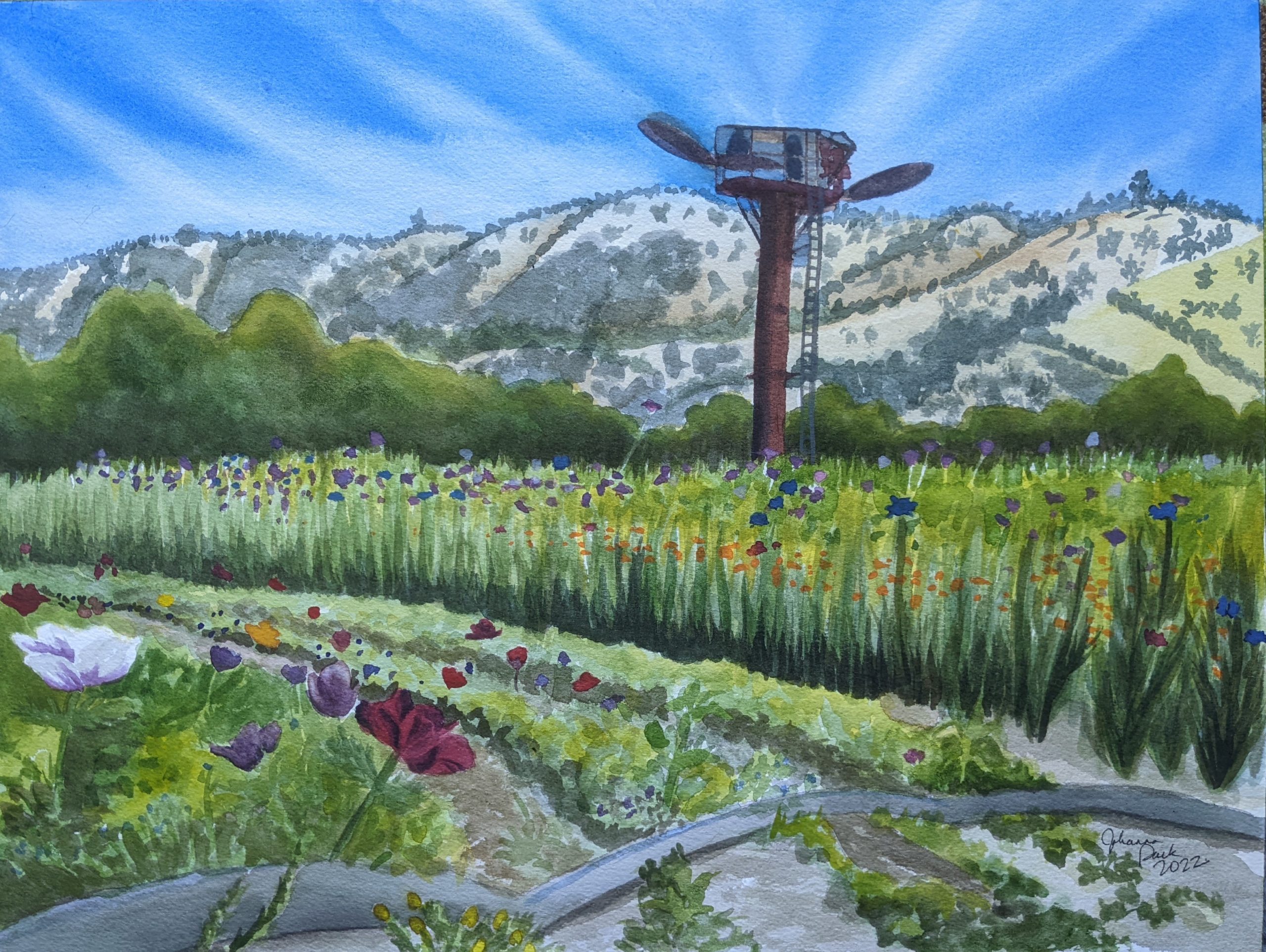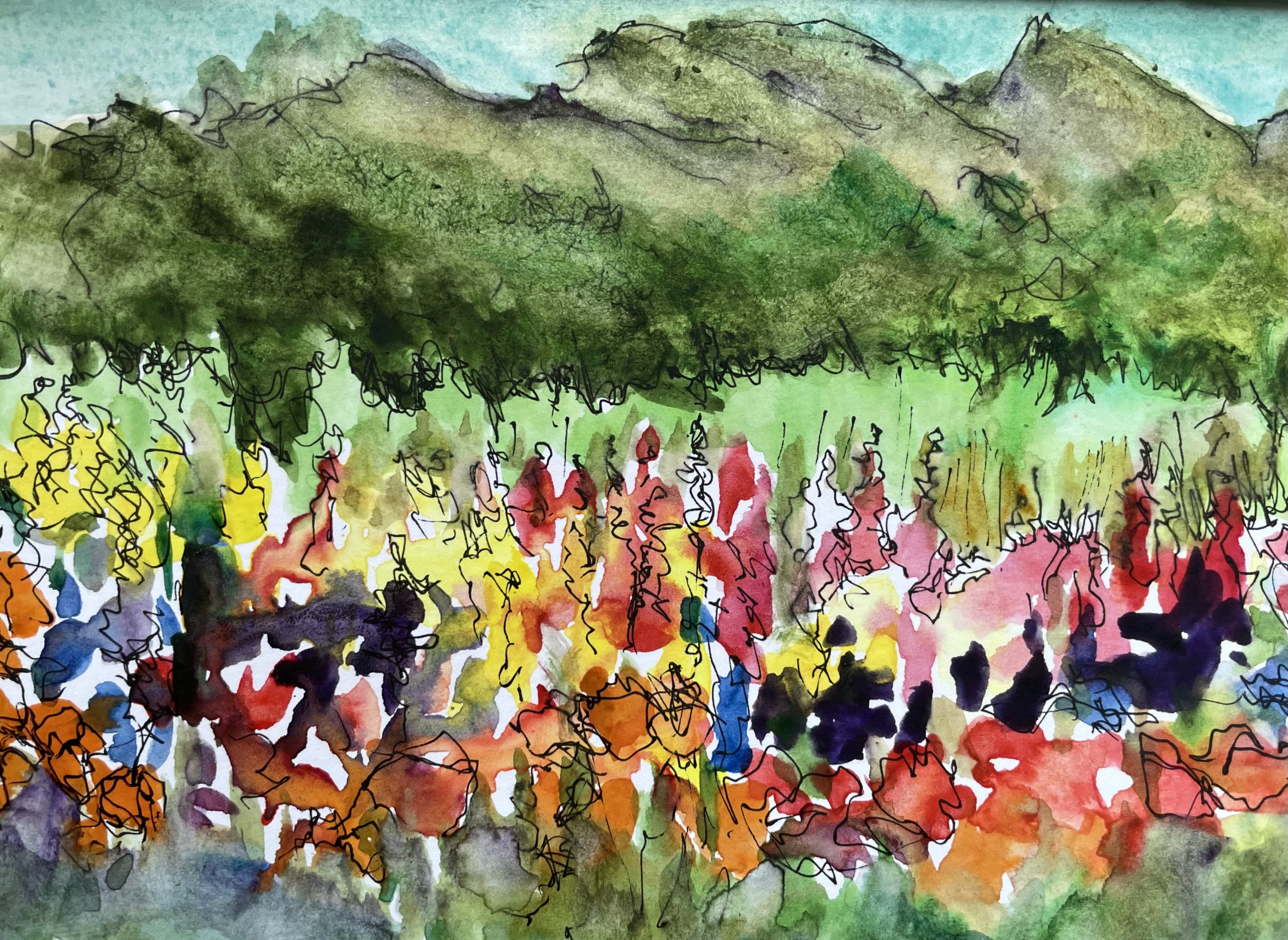
This week’s News from the Farm is from guest writer Dave Runsten, Senior Policy Analyst, Community Alliance with Family Farmers (CAFF). Dave and CAFF are long-time friends of Full Belly and advocates for farms like ours in Washington and Sacramento. We appreciate the great work that they do on our behalf and hope that you’ll support them (and us) by participating in their campaign. The images are some examples of the great artwork that recent farm guests with the Art & Ag Project from Yolo Arts shared with us. The top watercolor is from Johanna Pack and the bottom from is from Elly Gould.
The Drought and Small Farmers: #Don’t Let Small Farms Dry Up!
Like Full Belly Farm, there are many small farms in California that produce food for local communities. These are the thousands of farms at farmers’ markets, running CSAs and farm stands, and selling to restaurants. This group includes most beginning farmers, immigrant farmers, and farms run by people of color. Most of these farms are dependent on groundwater for food safety or because they are located outside irrigation districts.
These farms often have relatively shallow wells. They are impacted by large-scale mono-cropping, as investment groups plant tracts of nuts and dig deep wells. They will be impacted by the Sustainable Groundwater Management Act (SGMA, a 2014 state law that requires groundwater basins to halt overdrafting by 2040), as some local Groundwater Sustainability Agencies (GSAs) allow the groundwater to stabilize at levels below small farms’ shallow well depths. And they are impacted by climate change—scientists say the West is drier than it has been in 1,200 years. The current drought, the most severe since 1978, presents many of these farms with a real and immediate crisis—can they afford to lower their pumps or will they need a larger pump? Will they need to deepen their well or maybe even drill a new well? Without some financial assistance, many will go out of business and California will be the poorer for it.
Our friends Jeff and Annie Main of Good Humus Farm near Capay in Yolo County, a diversified fruit and vegetable farm, had their agricultural well go dry in 2021, as the water level had dropped some 14 feet. They had to lower their pump 60 feet to ensure it would function through the season. This comes after several years of falling water levels after a large almond orchard with deep wells was planted adjacent to their land some years ago. They submitted a report for their dry domestic well that failed several years ago and requested aid for a new 500-600 ft domestic well.
[Note from Full Belly: In 2021, we had one well go dry and stopped using two others because of the impact on neighbors’ water supplies. This year, we are regularly sounding our wells to assess water levels.]
The Public Policy Institute of California issued an estimate of how many domestic drinking water wells would go dry in the Central Valley in 2021-2022. They concluded: “…assuming that the decline in groundwater levels will be similar to declines observed in 2012–16…. Results suggest that around 2,700 wells could go dry this year, and nearly 1,000 more next year if dry conditions persist. Nearly half of these wells are in Fresno, Madera, and Tulare counties, but wells are also expected to run out of water in the wetter Sacramento Valley this time.”
Darcy Bostic of the Pacific Institute ran a similar analysis on shallow agricultural wells in the Central Valley and she concluded that 355 agricultural wells would go dry 2021-2022 and 5,524 agricultural wells in the Central Valley would need to lower or replace their pumps. This is a very conservative estimate, since it does not consider agricultural regions outside the Central Valley—such as the North Coast where numerous wells have already gone dry.
The state has set up funding mechanisms to help owners of rural drinking water wells that go dry but has no such assistance for small farms. Helping small farms survive the drought now could be seen as a down-payment on issues that will arise as SGMA is implemented.
Outreach to Small Farmers on Sustainable Groundwater Management Act (SGMA)
Small farmers were not separately considered in SGMA legislation and they have not been participating in most Groundwater Sustainability Agencies (GSAs), which are often controlled by irrigation districts, counties, and large farms. GSAs are not protecting small farms with shallow wells from the effects of falling groundwater levels, such as their wells drying up as neighbors with deep wells increase pumping during the drought.
Clean Water Action reviewed 14 Groundwater Sustainability Plans (GSPs) and found that none of them mentioned small farms. None of them conducted outreach to small farmers and only a couple involved small farmers in planning discussions. None of the GSPs considered potential impacts of groundwater levels on shallow irrigation wells or planned to monitor water levels near them, and none considered potential impacts of planned management actions on small farms, including well metering, pumping allocations, fees, and groundwater markets.
What will be required is individualized attention to small farmers to explain the proposed actions of their local GSA, how these actions might affect them, and how they can participate in the process. Small farmers need the GSAs to adopt policies that reduce costs, define allocations that grant them sufficient water to function, mitigate dry wells, and create water markets with an anonymous intermediary to ensure them access. Without these protections much of California’s local food system may not survive.
Take Action
Help us ensure small scale farmers are not left out of this year’s State Budget and can survive this year’s drought! We are asking you to call your state senator with the requests below.
If you live in the East Bay Area then you are likely a constituent of Nancy Skinner, who has an exceptional influence over the state budget process as Senate Budget Committee Chair. If you are not in the East Bay, then you can find your representatives here and substitute them for Sen Skinner. If you are one of Sen Skinner’s constituents, please call her office–(916) 651-4009–this week, using the following message:
“My name is _______ and I’m a constituent of Sen Skinner’s calling from . I am calling to urge her to support investments to ensure California’s small-scale and underserved farmers survive the current drought and are included in conversations around sustainable water use. I urge you to support:
1) the Governor’s proposed $25 million investment in CDFA’s California Underserved and Small Producers Program (CUSP), which will provide direct assistance to small farmers
2) the Governor’s proposed $75 million for Go-Biz’s new Small Agricultural Business Drought Relief Program, which has an $18.75 million small farmer carve-out
3) to ADD a one-time $10 million investment at DWR in programs to support outreach to small and underserved farmers so that they may participate in the development of the Sustainable Groundwater Management Act (SGMA) in their local communities
So much more is needed to support our food and farming communities in future years and we hope you can help to support farmers with this issue this year. Thank you so much for joining us on the campaign.
– Dave Runsten, Senior Policy Analyst, Community Alliance with Family Farmers

